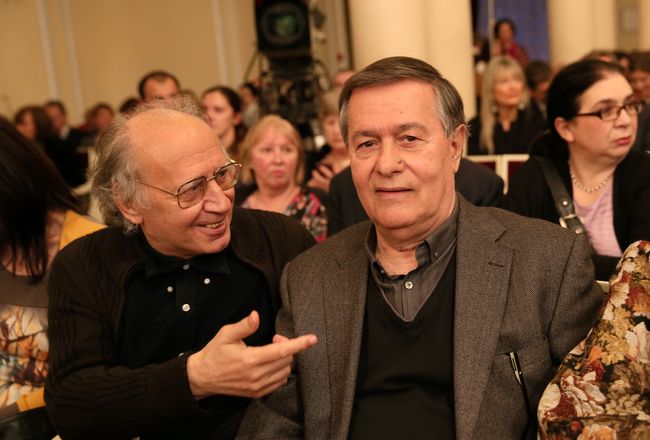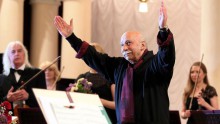The well-known composer who has been living in Antwerp for the past 20 years came to the Kyiv concert and secured a full house for the event. Kancheli’s oeuvre has been included in the programs of conservatoire courses of history of music of the 20th and 21st centuries. However, the thing is not about recognition in academic circles, but sincere love of the audience. Ukrainians love and understand this music. Giya Kancheli is extremely simple in expression, both in words and in music, but this simplicity (we have a complicated century) is very much in demand – the maestro speaks about things that worry everyone, at the same time glorifying modern plots to the level of ancient Greek tragedy.
At a press conference the composer was speaking about the most important things: love, wisdom, war, and peace. Kancheli noted that he loves and respects his homeland, but at the same time he has quite a critical attitude to it. He told about his latest work for the National Orchestra of Belgium, where the name includes three Sumer words – in a language that practically doesn’t exist. These are three syllables “Nu.Mu.Zu,” which are translated like “I don’t know.”
“When I was young, and then middle-aged, I thought I knew something,” Kancheli admitted. “Now, when I have turned 80, I have realized that I know nothing and I cannot understand what is going on around us. When a person has this kind of thoughts, they almost always are reflected in music, because when he stays on his own and creates something, it is impossible to avoid the effect of the events that are taking place in the world. Unfortunately, today there are many troublesome events in Ukraine, Georgia, and Asian countries.”
Giya Kancheli told how he left homeland and why he stayed abroad. “I think Belgium is one of the most tolerant countries, this is a multinational country, and Antwerp reminds me of my native Tbilisi.”
In 1991 the maestro won an artistic scholarship and went to Berlin for a year. That was the time when the civil war in Georgia began, so he decided to wait. “When I came to Berlin, avant-garde music was in the focus of attention, therefore I didn’t believe that my creative work would find its audience,” he admitted. “But currently my music is performed on all continents of our planet, and this is wonderful, because there should be different kinds of music – because the audiences are different, too.”
This Kyiv concert featured two Ukrainian premieres. The first one was Night Prayers, the final of the cycle “Life without Christmas,” which includes four parts, morning, daytime, evening, and night prayers. They were created at the order of the famous Kronos Quartet, and later, at the initiative of the director of the ECM Records, a new version for solo saxophone and string orchestra was created. In our capital it was performed by saxophonist Yurii Vasylevych and Kyiv Chamber Orchestra conducted by Roman Kofman. This is quiet, but intense music, in which sometimes the chords from Little Daneliade (a well-known potpourri to film music created by Kancheli was performed in the end of the evening), and in the final a descant-boy’s voice recorded on film overlaps the sound of the orchestra, this is one of the favorite methods of the composer. Domine exaudi vocem meam (Lord, hear my voice) – this phrase becomes especially touching when pronounced by a child.

MAESTRO VALENTYN SYLVESTROV AND FILM DIRECTOR ROMAN BALAIAN WERE THE GUESTS OF THE SOIREE
The second Ukrainian premiere was no less topical – Amao Omi for a mixed choir and quarter of saxophones, performed by Kyiv Quarter of Saxophonists (incidentally, it will turn 30 this year) and the Chamber Choir “Kyiv” conducted by Mykola Hobdych. Together with Lullaby to Sun, a kind children’s song where the sun is glorified in 27 languages, this music sounded especially dramatically. After the performance The Day had an opportunity to talk to the maestro.
“I HAVE STOPPED VISITING RUSSIA. WHAT IS GOING ON THERE IS UNPLEASANT FOR ME”
During the concert your work Amao Omi was performed. It says that war is madness. In your opinion, can art prevent war?
“If art could have any effect, Bach would have influenced, then Mozart, and so on. Unfortunately, art is unable to do this. Dostoevsky’s words that ‘beauty will save the world’ are unrealistic. We must try to preserve the beauty which is decreasing.”
You often visit Ukraine. What attracts you here?
“This is a person, with whom I have had spiritual contacts for half a century [nods at composer Valentyn Sylvestrov who stands next to him. – Author]. Each time in Kyiv I meet with conductor Roman Kofman and film director Roman Balaian. They are very close friends, and it is always pleasant to see them and talk to them, when I have an opportunity to come to Ukraine. This is also love to your country and the Ukrainian people. Especially because of the recent events. The only way I can express my protest is partially through music and my refusal to visit Russia. What is going on there is unpleasant for me.”
Do you maintain any contacts with your Russian colleagues?
“I am very much thankful to musicians who continue to perform my music there, but I wouldn’t say that the contacts have remained the same. Unfortunately, I have lost touch with some of my friends. I don’t want to name them and get deeper in this problem.”
What are your creative plans after the Belgian premiere of your new work Nu.Mu.Zu (I don’t know)?
“Until I hear my last work and break away from it, I cannot think about anything new. So, I have a relatively calm period of time now. Naturally, I am doing something, gathering topics, thinking about something, but I don’t have any concrete plans so far. Even if there were some, I would consider it as better not to talk about them in advance.”








